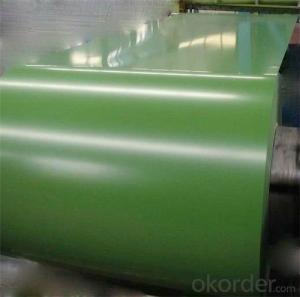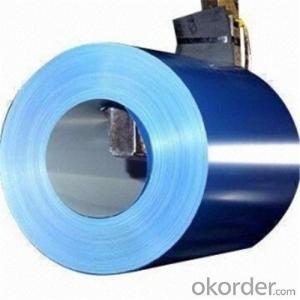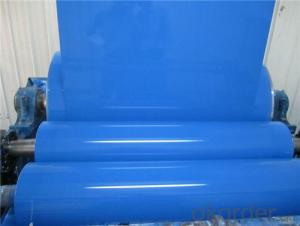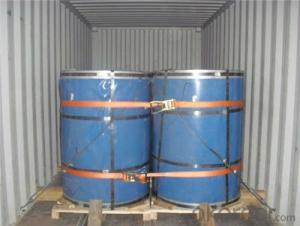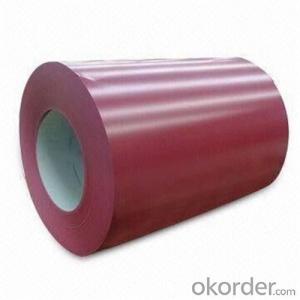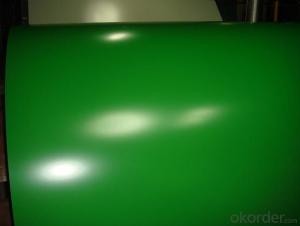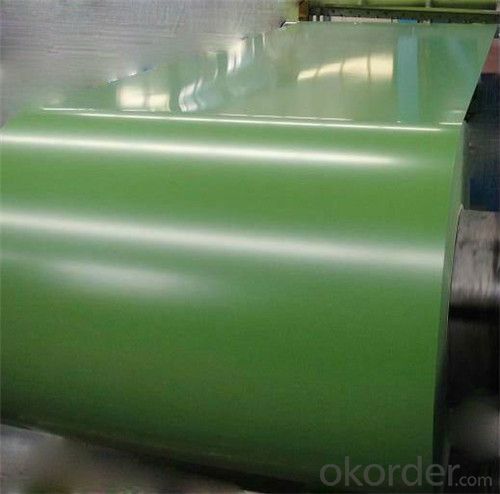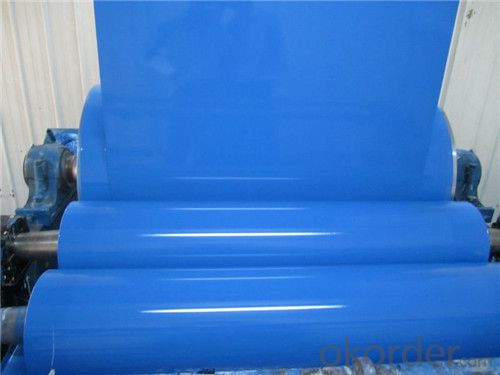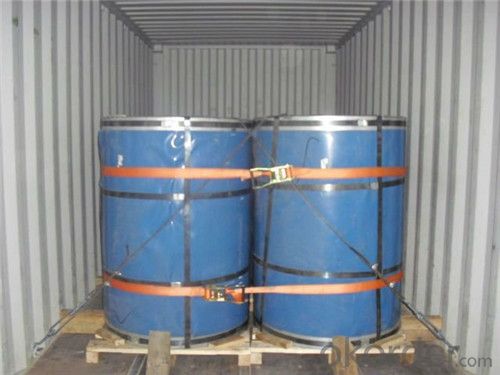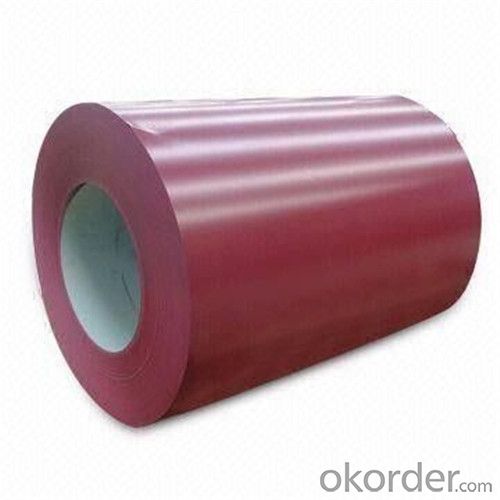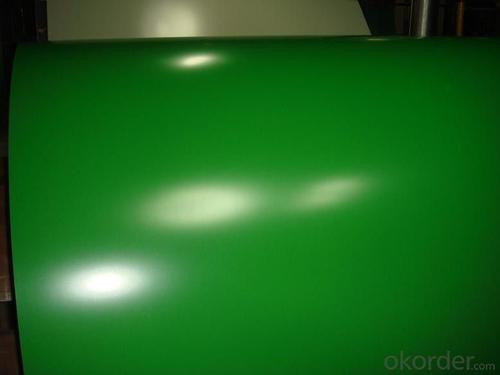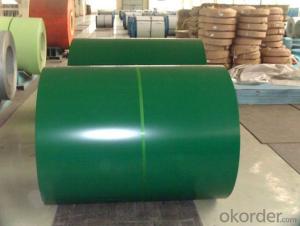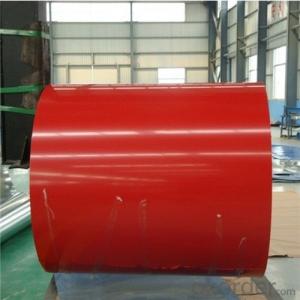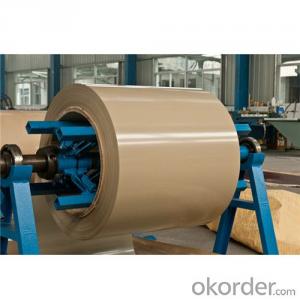BMP Z45 Rolled Steel Coil for Sandwich Panel
- Loading Port:
- Tianjin
- Payment Terms:
- TT OR LC
- Min Order Qty:
- 25 m.t.
- Supply Capability:
- 30000 m.t./month
OKorder Service Pledge
OKorder Financial Service
You Might Also Like
Structure of BMP Z45 Rolled Steel Coil for Sandwich Panel
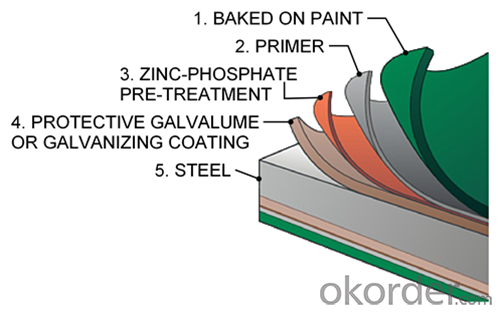
Description of BMP Z45 Rolled Steel Coil for Sandwich Panel
Prepainted Rolled steel Coil is a kind of coated steel coil/sheet. With the cold rolled steel of different strength and thickness as substrate, it is produced through applying Al-Zn coat on both faces by hot dip process. In its coating, Al accounts for about 55%, Si 1.6%, while the remaining is Zn. Aluminum zinc coils enjoys both the physical protective feature and durability of Al and the electrochemical protective property of Zn. And its surface has bright silver color and regular embossed-like figure, which are highly decorative.
Main Feature of BMP Z45 Rolled Steel Coil for Sandwich Panel
1.Corrosion resistance: It mainly depends on the aluminum protection. When the zinc being worn, the aluminum will form a dense layer of aluminum oxide, resist corrosion material to prevent further corrosion inside.
2. Heat resistance: Aluminum zinc alloy steel sheet has excellent heat resistance, can withstand high temperatures over 300 centigrade, and is similar with aluminized steel high temperature oxidation resistance. It often used in chimney pipes, ovens, fluorescent lighting device and the device cover.
3. Heat reflective: Galvanized steel plate heat-reflective high rate is twice as galvanized steel, often used to make insulation materials.
4. Economy: Because density of 55% AL-Zn is smaller than the density of Zn, so in the same weight and thickness of Galvanized zinc layer, aluminum-zinc steel plate is larger area more than 3% of galvanized steel sheet.
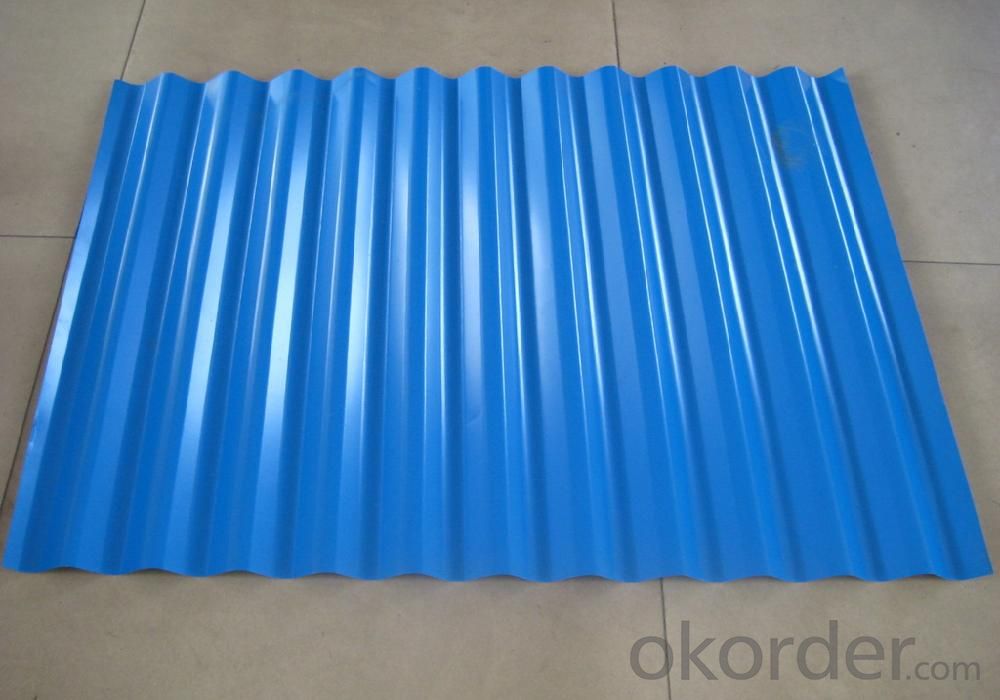
Applications of BMP Z45 Rolled Steel Coil for Sandwich Panel
1. Construction and building: roofing; ventilating duct; handrail; partition panel;etc.
2. Electric appliance: refrigerator; washing machine; refrigerator; DVD;etc.
3.Transportation: oil tank; gas tank;pentane tank; road sign; etc.
4.Agriculture:barn; etc.
5.Others:vending machine; game machine; etc.
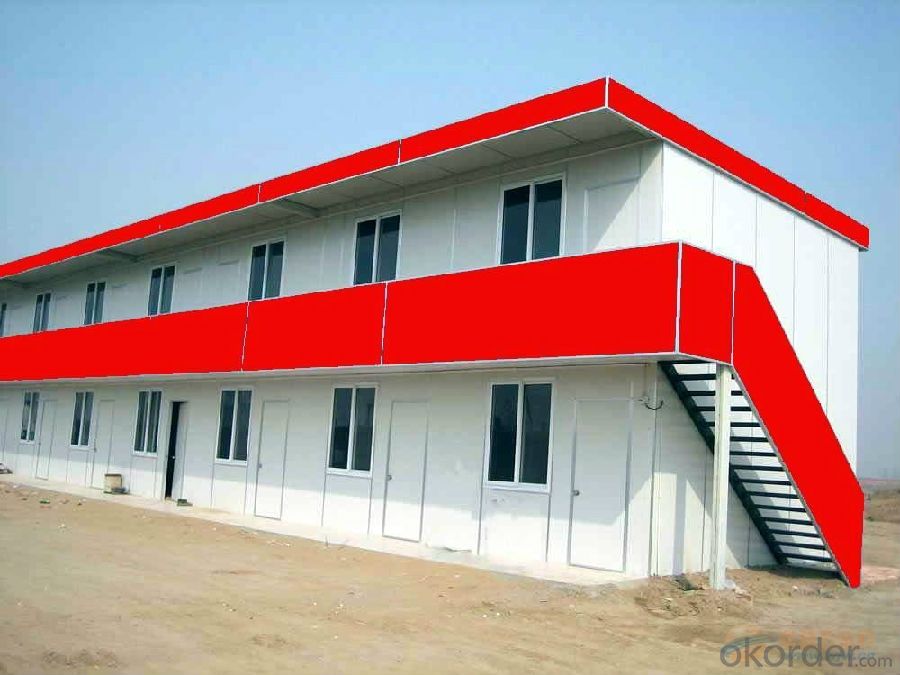
Specifications of BMP Z45 Rolled Steel Coil for Sandwich Panel
Product | BMP Z45 Rolled Steel Coil for Sandwich Panel |
Material Grade | SGCC / SGCH / DX51D+AZ, etc |
Thickness | 0.6-3.0mm |
Width | 500-1500mm |
Tolerance | Thickness: +/-0.02mm , Width:+/-2mm |
Zinc-coating | Z30-150g/m2 |
Technique | Raw material: Hot rolled steel coil --> Cold rolled_>hot dipped galvalume |
Surface | Dried, Chromated, Unoiled |
Spangle | Regular spangle , small spangle, zero spangle |
ID | 508MM 610MM |
Coil weight | 1-25MT |
Export package | Cardboard inner sleeves, Waterproof paper, galvanized steel covered and steel strip packed |
FAQ of BMP Z45 Rolled Steel Coil for Sandwich Panel
We have organized several common questions for our clients,may help you sincerely:
1. What is the minimum order quantity ?
Our MOQ is 50mt for each size. And we will consider to give more discount if you make big order like 1000 tons and more. Further more, the more appropriate payment term your offer the better price we can provide.
2. How long can we receive the product after purchase?
Our delivery time is around 30 day after order confirmed.
3. How to make sure the quality of the order?
We have quality control team over 40 QC every link from raw material to final product we have strict quality test.
- Q: How many percent carbon in low alloy steel and high alloy steel
- Steel is basically an alloy of iron and carbon that has more than 0% carbon and less than 2% carbon. The alloy of carbon and iron with more than 2% carbon is considered cast iron. The bessemer process converts cast iron to steel by injecting oxygen into molter cast iron to burn off the excess carbon. Steel is also modified by adding additional elements like silicon, molydenum, vanadium, chrome, etc.
- Q: I want to know if it is possible to make regular steel stainless.From what I understand stainless consist of chromium about 10 percent I think.Any way I'm wondering if properties can be added in a process or can this only be possible during actual manufacturing of the steel.And I'm not talking about chrome like stainless steel that's not to shiny.
- This okorder /
- Q: What products can we make with steel (eg Steel strip, rod, bar, rail, tube) How are these made? What can we make from these steel products?Can you please make the answers as detailed as possible you can because i really want to know this really well. Thank you.
- Your okorder (they make steel deck and steel joists) There are thousands of other items routinely produced from steel, including rebar, and all the metal in cars, airplanes, and about a million other things.
- Q: I am thinking about getting a cold steel tilite or a kershaw leek or possibly a buck sirus. If you have had any experience with these knives please give it to me. thanks
- Cold Steel while not made in the U.S. are still good knifes. I EDC a 2 Mini Tanto as my third knife for over 16 years. Recently the scales fell off and were lost, they are no longer available. My #2 EDC for the last 11 years has been a Kershaw Chive and it is still on my belt behind my Blackberry. I move between 2 EDC primary knives a 1996 Benchmade/Emerson CQC-7 and a Emerson Model I folder. I have gotten great service from all of them, and I rate them as follows: 1) Emerson 2) Cold Steel or Benchmade (Blue or Black Box product) 3) Benchmade (Red Box - made outside of US) or Kershaw All of the 2nd and 3rd tetieruys have non US products, not neccessarily bad. I have had good results all of them. Value for the dollar = Benchmade Blue Box. Decent value for entry price Kershaw is good as a first knife. Hope this helps.
- Q: I'm looking for the weight of different types of steel and haven't found anything helpful!!thank you
- Just know the type of steel ,its density. Density gives you weight per unit of volume. For example: The density of mild steel is approximately 7.85 g/cm^3 (0.284 lb/in^3) From above , you can say that 1 cm^3 of volume of mild steel have 7.85 gram weight.
- Q: How are steel coils inspected for defects after rewinding?
- Steel coils are inspected for defects after rewinding through a thorough visual examination and various non-destructive testing techniques such as ultrasonic testing, magnetic particle inspection, and eddy current testing. These methods help identify any surface defects, internal flaws, or deviations in dimensions, ensuring the quality and integrity of the steel coils.
- Q: i have recently gotten into DIY and am planning on making my own knife. My question is what kind of steel would be good to use for heat treating if i plan on using water and not oil in the process.
- Go to junkyard get old leaf spring, cut out knife, start sharpening. Why waste time heat treating steel when the spring steel as already be done.
- Q: How are steel coils used in the production of automotive body panels?
- Steel coils are used in the production of automotive body panels by being processed and formed into the desired shape and size. The coils are typically unwound and fed through a series of machines that stamp, press, or roll the steel into the required panel shape. This process allows for efficient mass production of body panels, ensuring strength, durability, and precision in the final product.
- Q: i want to know if i should buy a set of acrylic tapers or steel. they r close in cost so it's not a money factor i want to know which work better and if there is a downside to either. thanks!
- It relies upon on your physique and what you desire. in case you physique is allergic to a minimum of one in all them you may would desire to chosen for yet another one. If this is not any longer allergic to any, than you need to use in spite of you like the main, in simple terms attempt the two.
- Q: What are the different types of steel coil surface finishes?
- There are several different types of steel coil surface finishes available, each with its own unique characteristics and applications. Some of the most common types include: 1. Hot rolled: This finish is achieved by rolling the steel at a high temperature, which results in a rough and textured surface. Hot rolled steel coils are commonly used in applications where aesthetics are not a priority, such as structural or industrial projects. 2. Cold rolled: In contrast to hot rolled steel, cold rolled steel coils are processed at lower temperatures, resulting in a smoother and more refined surface. This finish is ideal for applications where a clean and polished appearance is desired, such as automotive parts, appliances, and furniture. 3. Galvanized: Galvanized steel coils are coated with a layer of zinc to protect them from corrosion. This finish provides excellent resistance to rust and can be used in a variety of outdoor applications, including roofing, fencing, and signage. 4. Stainless steel: Stainless steel coils have a unique finish that is resistant to corrosion, staining, and rust. This makes them highly versatile and suitable for a wide range of applications, including kitchen appliances, medical equipment, and architectural projects. 5. Coated: Coated steel coils are treated with a protective layer of paint or other coatings to enhance their durability and aesthetic appeal. This finish is commonly used in the construction industry for applications such as roofing, siding, and garage doors. 6. Pre-painted: Pre-painted steel coils are coated with a layer of paint or resin before they are formed into the final product. This finish offers a wide range of colors and finishes, making it popular for applications such as building cladding, appliances, and automotive parts. Overall, the choice of steel coil surface finish depends on the specific requirements of the project, including aesthetics, corrosion resistance, and durability. Each finish has its own advantages and disadvantages, and it is important to consider these factors when selecting the appropriate type of steel coil surface finish for a particular application.
Send your message to us
BMP Z45 Rolled Steel Coil for Sandwich Panel
- Loading Port:
- Tianjin
- Payment Terms:
- TT OR LC
- Min Order Qty:
- 25 m.t.
- Supply Capability:
- 30000 m.t./month
OKorder Service Pledge
OKorder Financial Service
Similar products
Hot products
Hot Searches
Related keywords
